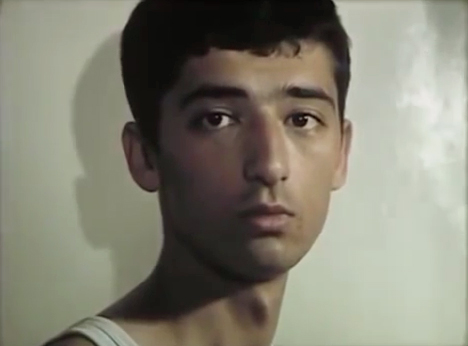Osmondagi Bolalar

May 29, 2020 - June 05, 2020
Four friends grow up together, smoke together for the first time, and break down Bakhtiyer's father’s car and repair it together. They also experience their first love together — their common love Lola. This causes disagreements between them.
The author of the film is only a director
Zulfikar Musakov is an Uzbek scriptwriter and a director, as well as the subject of our interview. Musakov is the maker of famous films: “Boys in the Sky” (2002), “Abdulladzhan” (1991), “Bomb” (1995), and many others that have contributed to the development of Uzbek cinema and are loved by critics and viewers. Musakov’s films are always about the life of ordinary people and their difficult trials, and serve to create a collective portraiture. Materials used: pv.uz, kun.uz, fergana.news.
Interview
Asal Esanova, CCA LAB participant
In one of your interviews, you say: “If I could start my life all over again, I would change it and become a surgeon”. May I ask why a surgeon?
– Because surgeons, and doctors in general, literally repair our organisms, change something there, cut something off... They are the intermediaries of our lives between heaven and earth.
When did you realize you would become a director? What or who pushed you to this choice?
– Once in the Kumlak mahalla, near our school, a film was being made. We ran there. I was asked to run a hundred meters from the camera. So I earned my first 6 rubles in my life... Much later, I found out that the ingenious film “20 Days without War” was shot, and the director of the film, Aleksey Yuryevich German, conducted a workshop in Moscow as part of the Higher Director's Courses more than 30 years later.
In your opinion, what are the main qualities a director should have?
– Honesty, talent, professionalism.
Today, there is a lot of talk about the fact that young people are not interested in anything except computers and mobile phones. There has been a substitution of spiritual values for cheap consumer goods, pseudo-ideals. In your opinion, is cinematic art capable of fundamentally changing this situation?
– The director Andrei Mikhalkov-Konchalovsky said: “The fate of the people depends on their culture... When young people see that older people think one thing and say another, and do a third, disbelief and cynicism arise... And this happens in front of them. In front of them, older people blame everything that was the day before yesterday and yesterday... Because of this they retire into themselves, or to the Internet. ” Your humble servant is a narrow specialist, but I am convinced that cinema can make a difference. It depends on who finances the works. Despite the development of digital technology, cinema is quite an expensive art. For various reasons, only in three countries —India, Nigeria and the USA – has it become a big business. In India, the cinema is more than the cinema; it is the same as football is for Brazil. An Indian beggar will starve for a week to collect 20 rupees for attending a show, and for at least two hours he will immerse himself in the world of dreams and songs... In the USA, this is a century-old huge industry, and after all, out of 1000 films, a maximum of 20 pay off. And Nigeria has found a very profitable [industry]: 800 million audience members across Africa... The rest exist entirely or partially on the money of states trying to preserve their art and protect it from the expansion of Hollywood. Why do I dwell on this in such detail? Cinema is a powerful means of influencing the minds of young people.
One of the main obstacles to the release of the Uzbek series in your scenario, you called "tribalism and grouping at the box office."How do you describe the film community in Uzbekistan?
– The question is somewhat incorrect, for the box office is practically absent; how can we talk about the film industry in a country where there are only 61 cinemas for 34 million people? There is tribalism and [herd mentality], terrifying incompetence, and amateurism in the selection of projects for the state orders... Thank God, I don’t belong to any clans and groups, and if I have to, I speak openly only in my own name.
What is the situation with the state support of cinema today?
– This, of course, is my personal opinion. Cinema without the help of the state will die. Uzbekfilm is my second home. I came to this building as a director 33 years ago and my whole life has passed here... I would first give all state orders to the main studio of the country, and then to the rest...
What, in your opinion, is the connection between putting out films worthy of the highest awards, and those attracting audience attention (that is to say, low-quality productions)? Will state financing solve this issue or is it still a matter of a master who can take pictures even with a modest budget?
– My late friend, German professor Hans Joachim Schlegel said: “Any national cinema is made not by money, not by officials, but by specific directors.” Unfortunately, there are a lot of people who put on a baseball cap and only know how to shout “Action”, who call themselves directors. In fact, for me personally, they are only aggressive amateurs. They have, it would seem, everything - self-PR, paid publications, and money. But they lack two things - brains and talent. In the cinema, you still need to work not only with your elbows, your tongue, but include your head and heart ... And these are helped by people who do not have specialized education, who have not made a single film. And none of them will ask themselves a simple question: “What right do I have to talk about cinema if I don’t understand anything in this matter?” I have seen a lot of such verbiage over 30 years.
Who do you call your main teachers in life?
– O.K. Fiala, O.A. Chernov, A.S. Kuzin – in the theater, V.V. Menshov, V. A. Grammatikov – in the cinema.
In the film “Papa Got Sick” you give a letter addressed not to the world of adults, mostly hypocrites and bigots, but to a little girl. But after all, children grow up. How does one maintain a childish, pure perception of the surrounding reality?
– Difficult question. I cannot give a definite answer to it. At least, I strive for this in life and art.
George Danelia is one of those people whose creativity inspires you, right? I recently read his interview, where Georgy Nikolaevich talks about how, before each new shooting day, he took the scriptwriters with him and rewrote the entire script, and on the day of shooting allowed the actors to improvise, how do you feel about script and improvisation?
– Very well. Tonino Guerra never came to shoot. He wrote: "The author of the film is only a director".
Can you say that you fall in love with certain actors because some of them appear again and again in your work? (For example Bobur Yuldashev, Fatima Rezhametova, etc.) What are your methods of working with an actor?
– It would be immodest of me… To work with good actors and people is a holiday. For my group, filming is a celebration.
If we talk about your work as a whole, do you represent your audience?
– You know, I’m lucky. There are 12-15 people who not only reject my films, but hate them, and they declare this publicly in the media, although I practically do not know them... And there are millions of people who have been watching my films for 30 years now, and several times. Is this happiness?
What are you working on now?
– “Goodbye Screenwriter.” Filming has been interrupted due to quarantine...
You said that the main criterion in the cinema is not the viewer's assessment or even criticism, the main thing is the test of time. This begs my question: to which films can you come back to again and again?
– To my own? It would be immodest. And in the world? There are masterpieces that have become part of our life. There are a lot of them.
